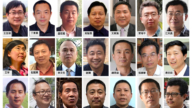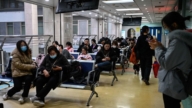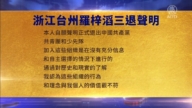【新唐人2013年03月11日訊】一位政府消息人士表示,中共新領導層正計劃逐步推出居住證制度,來改革當前戶籍制度,他說,這一改革對推動城鎮化,和促進消費型經濟增長,至關重要。多年來,眾人一直呼籲改革這個具歧視性的戶籍制度,那麼,這次真的能改變嗎?請看本臺記者的分析報導。
一名政府研究者告訴《路透社》,「一個統一的全國居住證制度將被採納,作為10年城市化計劃的一部分,並將在兩會之後發佈。」他指出,改革將緩慢進行,趨勢是淡化城鄉居民戶籍區分。但他並未透露這項計劃需要多長時間。
中共總理溫家寶6號在政府工作報告中宣稱,應加快戶籍制度改革,推動城鎮化。發改委主任張平同一天也透露,正協同多個有關部委,編製中國城鎮化發展規劃,預計上半年就可出臺。
公安部副部長最近也表示,正力爭儘快頒佈實施居住證管理辦法,第一步是小城市和小城鎮放開落戶限制。
廣東東莞農民工曹先生:「居住證制度比以前的暫住證制度是要稍微好一點,但這並不能從根本上解決2億多農民工的公平待遇問題。」
這位廣東東莞的曹姓農民工表示,目前在廣東居住5年後才能入戶,作為流動性很強的農民工,很難保障住處的穩定。因此他認為,根據當前的土地政策,農民工受歧視不可避免;另外,即使在打工處落戶,老家的土地、房產很難去處理,所以,土地不私有化,這些問題不能得到徹底解決。
東南大學法學教授張讚甯:「戶籍制度對農民工是很不利的,我們中國還沒有遷徙自由。他要是沒有當地戶口,小孩就沒有學可上,醫保都受很大的影響,高考都受很大的影響。如果採取居住制度,那就不以戶籍為省,以居住地為省,對外來人口的歧視會有所好轉。」
「北京師範大學」經濟學者段紹譯指出,取消戶籍限制有多方面的好處:它能減少農民工的資源浪費、節約農村土地,還能利於城市的經濟發展,甚至徹底改變春運緊張的問題。
「北京師範大學」經濟學者段紹譯:「公民的身份證取得平等地位,這種方向是不可阻擋的。這種居住證制度推出來,也是慢慢改變城鄉差別,也是一種過渡。」
段紹譯表示,這會損害一部分既得利益集團的利益,他們會對這種改革進行阻攔。
「華盛頓大學」人口學專家Kam Wing Chan也指出,如果處理不當,不僅城市中產階級不會擴大,反倒會出現龐大的底層階級,這種情況很可怕。
深圳當代社會觀察研究所所長劉開明「那麼多農村人進城,肯定他需要穩定的工作、穩定的住房、穩定的收入,可以發展未來,那麼很重要的生活成本要降低。生活成本降低不是他們個人能解決的,必須由政府來解決。因為生活成本最大的是住房、教育、養老,這些都是生活成本,必須政府來解決。」
著名經濟學者程曉農指出,在1957年以前,中國農民基本上是可以自由進城的,而且中國歷代歷朝從來沒有實行過戶籍制度。但是由於毛澤東推行的「大躍進」,餓死幾千萬人,從此中國的城鄉就被「戶籍管制」這個巨大的鴻溝隔離開來了。
目前,全世界也只有中國、北韓和貝南三個國家,實行嚴格的戶籍制度,但北韓的戶籍制度,並沒有在農民和工人之間劃出差異性鴻溝。
而中國,到現在也還在中共這個不否定毛澤東的政權下執政!因此,指望中共解決這一歷史惡果,並不現實。
採訪/易如 編輯/宋風 後製/蕭宇
Residence Permit vs. Household Registration
A government informant said the Chinese Communist Party(CCP) new leadership is planning to gradually introduce a residence permit system, to reform the current household registration system.
He said, this reform is essential to the promotion of urbanization and the growth of consumer-based economy. Over the years, everyone has been calling for reform of the discriminatory household registration system. Can it really be changed this time? Let’s see our reporter‘s analysis of the situation.
A government researcher told Reuters, “a unified national residence permit system will be adopted as part of a 10-year urbanization plan, and will be released after the two sessions."
He pointed out that the reform would be conducted slowly, with a trend to dilute household registration distinction between urban and rural residents.
But he did not disclose how long the plan will take.
CCP Premier Wen Jiabao claimed in the government work report on March 6th that it should accelerate the reform of the household registration system and promotion of urbanization. Zhang Ping, the secretary of Development and Reform
Commission also revealed the same day that he was collaborating with various relevant ministries to prepare the urbanization development plan, introduced as early as the first half of 2013.
Deputy Minister of Public Security said recently, he was to promulgate and implement residence permit management approach as soon as possible. The first step is the lift of small cities and small towns settlement restrictions.
Mr. Cao, a migrant worker in Guangdong: “Residence permit system will be a slight improvement on the previous temporary residence permit system, but it could not resolve the unfair treatment to over 200 million migrant workers.”
Mr. Cao said, currently migrant workers can only have a household permit after five years of residence in Guangdong. The highly mobile migrant workers find it hard to protect the stability of their residences. Therefore, he believes that discrimination against migrant workers is inevitable under the current land policy. Also even though they settled where they worked, real estate properties are very difficult to deal with. So if the land is not privatized, these problems cannot be completely resolved.
Zhang Zanning, professor of law in Southeast University:"Household registration system is very detrimental for migrant workers, and there is no freedom of migration in China. With no local registered residence, the child could not go to school, and their medical insurance would be greatly impacted. This would also greatly affect them in the college entrance examination. If you take a residence permit system, the hometown is not the household registered province, but the residence province. So discrimination of the foreign provincial population will be improved."
Duan Shaoyi, Beijing Normal University economist pointed out deleting household registration restriction has many benefits. It can reduce the waste of resources of the migrant workers, saving rural land, and also be conducive to the economic development of the city, or even completely change the tension in transportation during the Chinese New Year.
Duan Shaoyi:"Citizens’ ID card will have equal status, this direction is unstoppable. This residence permit system introduced is to slowly change the differences between urban and rural areas as a transition."
Duan said it will harm the benefits of some vested interests groups, and they will try to hinder such reforms.
Kam Wing Chan, a demographic expert in University of Washington, pointed out that if not handled properly, urban middle class would not increase, but there will appear a huge underclass, which will be very terrible.
Liu Kaiming, director of Shenzhen Institute of Contemporary Observation:"So many rural people got into the city. They certainly need stable jobs, housing, income, and future development, so it is important reduce the cost of living.
This can』t be solved by themselves, but should be solved by the government.
The major cost of living is housing, education and pensions, which must be solved by the government."
Cheng Xiaonong, a famous economist pointed out that before 1957, Chinese farmers can go freely into the city. In ancient Chinese dynasties, there was never any household registration system. However, due to “Great Leap Forward” launched by Mao Zedong, thousands of people were starved to death. Since then urban and rural areas of China were isolated by the huge gap of household registration control.
In the world, only three countries have a strict household registration system, including China, North Korea, and Benin. But North Korea’s household registration system does not have differences between the peasants and the workers.
China is now still under the ruling of the CCP which does not deny the Mao regime! Therefore, to expect the CCP to solve the evil historical consequences is not realistic.


























